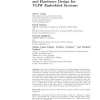Free Online Productivity Tools
i2Speak
i2Symbol
i2OCR
iTex2Img
iWeb2Print
iWeb2Shot
i2Type
iPdf2Split
iPdf2Merge
i2Bopomofo
i2Arabic
i2Style
i2Image
i2PDF
iLatex2Rtf
Sci2ools
IJES
2007
2007
Energy-aware compilation and hardware design for VLIW embedded systems
Abstract: Tomorrow’s embedded devices need to run high-resolution multimedia applications which need an enormous computational complexity with a very low energy consumption constraint. In this context, the register file is one of the key sources of power consumption and its inappropriate design and management can severely affect the performance of the system. In this paper, we present a new approach to reduce the energy of the shared register file in upcoming embedded VLIW architectures with several processing units. Energy savings up to a 60% can be obtained in the register file without any performance penalty. It is based on a set of hardware extensions and a compiler-based energy-aware register assignement algorithm that enable the de/activation of parts of the register file (i.e. sub-banks) in an independent way at run-time, which can be easily included in these embedded architectures.
| Added | 15 Dec 2010 |
| Updated | 15 Dec 2010 |
| Type | Journal |
| Year | 2007 |
| Where | IJES |
| Authors | José L. Ayala, Marisa López-Vallejo, David Atienza, Praveen Raghavan, Francky Catthoor, Diederik Verkest |
Comments (0)

